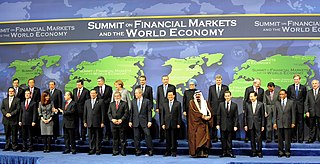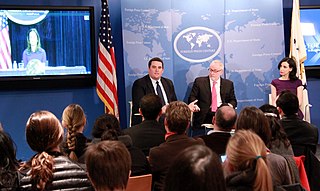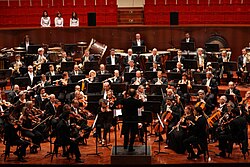The Clinton Doctrine is not an official government statement but an interpretation made by experts of the main priorities in the foreign policy of the Bill Clinton administration in the United States, 1993-2001.
In politics, hard power is the use of military and economic means to influence the behavior or interests of other political bodies. This form of political power is often aggressive (coercion), and is most immediately effective when imposed by one political body upon another of less military and/or economic power. Hard power contrasts with soft power, which comes from diplomacy, culture and history.
In politics, soft power is the ability to co-opt rather than coerce. It involves shaping the preferences of others through appeal and attraction. Soft power is non-coercive, using culture, political values, and foreign policies to enact change. In 2012, Joseph Nye of Harvard University explained that with soft power, "the best propaganda is not propaganda", further explaining that during the Information Age, "credibility is the scarcest resource".
In international relations, power is defined in several different ways. Material definitions of state power emphasize economic and military power. Other definitions of power emphasize the ability to structure and constitute the nature of social relations between actors. Power is an attribute of particular actors in their interactions, as well as a social process that constitutes the social identities and capacities of actors.
In international relations, public diplomacy or people's diplomacy, broadly speaking, is any of the various government-sponsored efforts aimed at communicating directly with foreign publics to establish a dialogue designed to inform and influence with the aim of building support for the state's strategic objectives. These also include propaganda. As the international order has changed over the twentieth century, so has the practice of public diplomacy. Its practitioners use a variety of instruments and methods ranging from personal contact and media interviews to the Internet and educational exchanges.

In international relations, a middle power is a sovereign state that is not a great power nor a superpower, but still has large or moderate influence and international recognition.
A United States presidential doctrine comprises the key goals, attitudes, or stances for United States foreign affairs outlined by a president. Most presidential doctrines are related to the Cold War. Though many U.S. presidents had themes related to their handling of foreign policy, the term doctrine generally applies to presidents such as James Monroe, Harry S. Truman, Richard Nixon, Jimmy Carter and Ronald Reagan, all of whom had doctrines which more completely characterized their foreign policy.

Joseph Samuel Nye Jr. is an American political scientist. He and Robert Keohane co-founded the international relations theory of neoliberalism, which they developed in their 1977 book Power and Interdependence. Together with Keohane, he developed the concepts of asymmetrical and complex interdependence. They also explored transnational relations and world politics in an edited volume in the 1970s. More recently, he pioneered the theory of soft power. His notion of "smart power" became popular with the use of this phrase by members of the Clinton Administration and the Obama Administration.
Cultural diplomacy is a type of public diplomacy and soft power that includes the "exchange of ideas, information, art, language and other aspects of culture among nations and their peoples in order to foster mutual understanding". The purpose of cultural diplomacy is for the people of a foreign nation to develop an understanding of the nation's ideals and institutions in an effort to build broad support for economic and political objectives. In essence "cultural diplomacy reveals the soul of a nation", which in turn creates influence. Though often overlooked, public diplomacy has played an important role in achieving national security efforts.
Liberal internationalism is a foreign policy doctrine that supports international institutions, open markets, cooperative security and liberal democracy. At its core, it holds that states should participate in international institutions that uphold rules-based norms, promote liberal democracy and facilitate cooperation on transnational problems.

Digital diplomacy, also referred to as Digiplomacy and eDiplomacy, has been defined as the use of the Internet and new information communication technologies to help achieve diplomatic objectives. However, other definitions have also been proposed. The definition focuses on the interplay between internet and diplomacy, ranging from Internet driven-changes in the environment in which diplomacy is conducted to the emergence of new topics on diplomatic agendas such as cybersecurity, privacy and more, along with the use of internet tools to practice diplomacy.

The Institute of World Politics (IWP) is a private graduate school of national security, intelligence, and international affairs in Washington, D.C., and Reston, Virginia. Founded in 1990, the school offers courses related to intelligence, national security, and diplomatic communities.
Economic diplomacy is a form of diplomacy that uses the full spectrum of economic tools of a state to achieve its national interests. The scope of economic diplomacy can encompass all of the international economic activities of a state, including, but not limited to, policy decisions designed to influence exports, imports, investments, lending, aid, free trade agreements, among others.
In international relations, the term smart power refers to the combination of hard power and soft power strategies. It is defined by the Center for Strategic and International Studies as "an approach that underscores the necessity of a strong military, but also invests heavily in alliances, partnerships, and institutions of all levels to expand one's influence and establish legitimacy of one's action."

The Quadrennial Diplomacy and Development Review (QDDR) is a study by the United States Department of State, conducted beginning in 2009 and intended to be done every four years, that analyzes the short-, medium-, and long-term blueprint for the United States' diplomatic and development efforts abroad. It seeks to plan on a longer-term basis than the usual year-to-year, appropriations-based practice, and to integrate diplomacy and development missions. It similarly seeks to correlate the department’s missions with its capacities and identify shortfalls in resourcing. Finally, it is a precursor to core institutional reforms and corrective changes. The first review was completed by the end of 2010. A second review began during 2014 and was released in April 2015. No further reviews have taken place.

Diplomacy comprises spoken or written communication by representatives of states intended to influence events in the international system.

Cyber-diplomacy is the evolution of public diplomacy to include and use the new platforms of communication in the 21st century. As explained by Jan Melissen in The New Public Diplomacy: Soft Power in International Relations, cyber-diplomacy “links the impact of innovations in communication and information technology to diplomacy.” Cyber-diplomacy is also known as or is part of public diplomacy 2.0, EDiplomacy, and virtual diplomacy. Cyber-diplomacy has as its underpinnings that, “it recognizes that new communication technologies offer new opportunities to interact with a wider public by adopting a network approach and making the most of an increasingly multicentric global, interdependent system.”

Smart Power: Between Diplomacy and War, is a 2013 book written by Christian Whiton with a foreword by Paula Dobriansky. Both were diplomats in the George W. Bush administration.
The term public diplomacy was first coined and used by Edmund Gullion in 1965 and the concept developed gradually. More recently, the definition of public diplomacy differs according to different authors. Taehwan Kim in his article "Paradigm Shift in Diplomacy: A Conceptual Model for Korea's "New Public Diplomacy"" defines it as "a diplomatic practice or field of academic research which includes non-conventional actors to promote diplomacy of the people". As the importance of public diplomacy increases, South Korea is putting more efforts to engage in the new trend of diplomacy. Muzaffar S. Abduazimov in his article "Public Diplomacy: Reappraising the South Korean Case through an Evolutionary Approach" presents four evolutionary periods of South Korean public diplomacy: origins, diversification, polycentrism, and institutionalization (2011–present).
Energy diplomacy is a form of diplomacy, and a subfield of international relations. It is closely related to its principal, foreign policy, and to overall national security, specifically energy security. Energy diplomacy began in the first half of the twentieth century and emerged as a term during the second oil crisis as a means of describing OPEC's actions. It has since mainly focused on the securitization of energy supplies, primarily fossil fuels, but also nuclear energy and increasingly sustainable energy, on a country or bloc basis.










